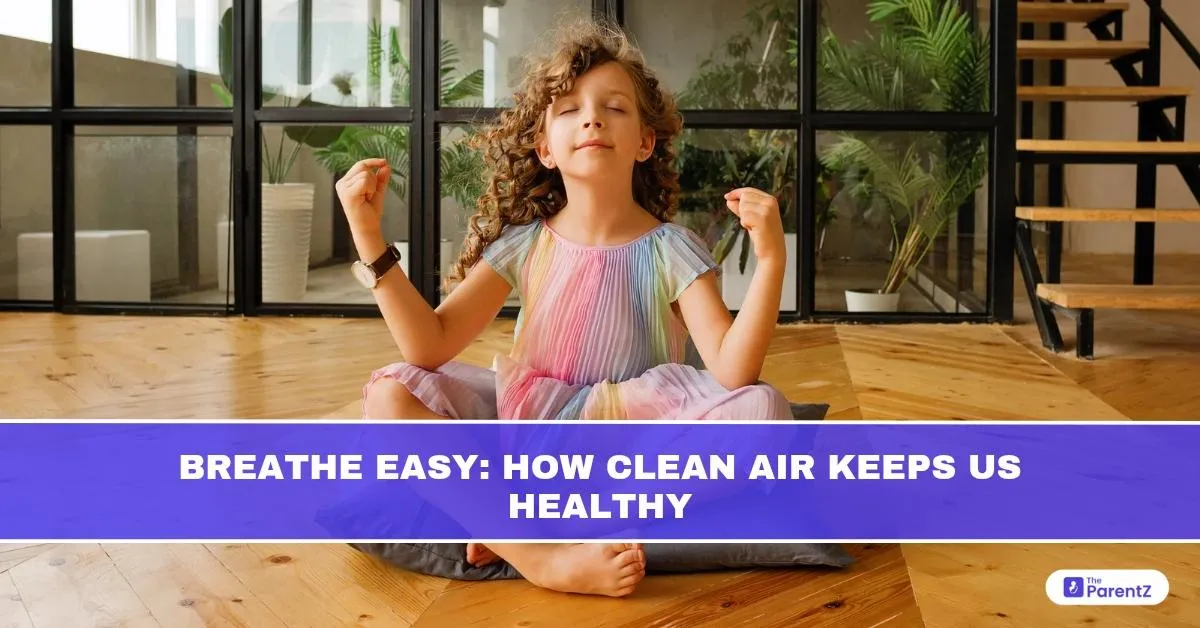Did you know that the air you breathe is like the invisible food for your body? Every breath you take fills your lungs with oxygen, helping your heart, brain, and every little cell in your body to work correctly. But what happens when the air is not so clean? Let’s explore how clean air keeps us healthy, what makes air dirty, and how we can all make small changes to protect our health, especially the health of little kids, whose lungs are still growing!
Why Does Clean Air Matter So Much?
Imagine this: your lungs are like sponges. Every time you breathe in, they soak up oxygen from the air and send it to your blood. But if the air is filled with smoke, dust, or harmful gases, your lungs soak up those too!
Clean air is like a refreshing drink of water for your body. It gives you oxygen without the “bad stuff” that can hurt your lungs, heart, and brain. Dirty air, on the other hand, can make you cough, feel tired, or even cause serious problems like asthma, lung infections, and, in the long term, even cancer or heart disease.
For kids, the stakes are even higher. Children breathe faster than adults, meaning they take in more air per minute! Their lungs are still developing, so if they grow up breathing polluted air, it can slow down lung growth and increase their susceptibility to illnesses.
What’s in Dirty Air?
Air pollution is like a cocktail of harmful things, some you can see and some you can’t. Here’s what you might find in polluted air:
Particulate Matter (PM2.5 and PM10): Tiny bits of dust, smoke, and soot that are so small they can get deep into your lungs and even into your bloodstream.
Nitrogen Dioxide (NO₂): Mainly comes from car exhaust and factory smoke. It irritates your airways and can exacerbate asthma.
Sulfur Dioxide (SO₂): Produced when coal or oil is burned, it can cause breathing problems.
Ozone (O₃): Wait, isn’t ozone supposed to protect us? Well, high up in the sky (the ozone layer), it’s a shield, but near the ground, ozone is a harmful gas that can make your eyes sting and your lungs hurt.
Carbon Monoxide (CO): A sneaky gas that can prevent your blood from carrying oxygen properly.
And let’s not forget indoor air pollution, which includes things like smoke from cooking, dust, mold, pet dander, and even strong smells from cleaning sprays or perfumes.
How Dirty Air Hurts Your Body
Let’s get a bit science-y (but fun!) for a moment:
Lungs: Dirty air can irritate your lungs like sandpaper rubbing against your skin. It can cause asthma attacks, coughing, and infections like bronchitis.
Heart: Yes, the heart can also suffer! Tiny particles from pollution can enter your blood and make your heart work harder, increasing the risk of heart disease.
Brain: Some studies show that air pollution can affect brain development in children and might even lead to problems like ADHD or memory issues later in life.
Babies and Moms: Pregnant women exposed to polluted air have a higher risk of having babies born too early or too small.
Fun Air Facts for Curious Kids
We breathe about 11,000 litres of air every day, that’s enough to fill 55 bathtubs!
Trees are the superheroes of clean air. A single big tree can absorb as much as 22 kg of carbon dioxide a year and release oxygen for four people!
Air pollution can travel. Dust from the Sahara Desert can blow all the way across the Atlantic Ocean to the Americas!
What Can We Do to Keep the Air Clean?
The good news? We can make a difference! Here are simple things you and your family can do:
Let fresh air in: Open windows for at least 15–20 minutes every day to let out indoor pollutants.
Go green with plants: Indoor plants like snake plant, spider plant, and aloe vera are natural air purifiers.
Avoid burning waste: Don’t burn garbage or dry leaves, as this releases harmful gases into the air.
Say no to smoking: Smoking inside the house is a big no-no for clean air.
Choose clean cooking: Use a chimney or exhaust fan while cooking to avoid smoke build-up.
Check the AQI: The Air Quality Index (AQI) tells you how clean or dirty the air is. If the air outside is too polluted (AQI over 200), try to stay indoors.
Cycle or walk when you can: Fewer cars mean cleaner air. Plus, it’s a great way to stay fit!
Celebrate “No Car Days”: Encourage your school or neighborhood to have car-free days—great for the air and family fun.
Get involved: Plant trees, support local clean-air initiatives, and talk to your community about reducing pollution.
Quick Tips for Parents
- If your child has asthma, keep their inhaler handy and monitor the AQI daily.
- On days when the air is significantly polluted, limit outdoor activities, especially for kids.
- Keep indoor air clean by using a vacuum cleaner with a HEPA filter and avoiding strong chemical sprays.
- Use an air purifier if you live in a high-pollution area, especially in your child’s bedroom.
- Teach kids about clean air through fun games like “Who Can Spot the Clean Air Heroes?” or “Air Pollution Detective.”
Let’s Breathe Easy Together
Clean air isn’t just something we wish for, it’s something we work for, together. By making small changes in our homes, schools, and communities, we can help keep our air fresh and our lungs happy. Remember, every deep, clean breath we take is a little gift of health, for us and for the future of our planet.
So, the next time you step outside and take a big, deep breath, smile! You’re filling your body with life, energy, and the goodness of clean air. Let’s all do our bit to make sure every breath counts.





Be the first one to comment on this story.